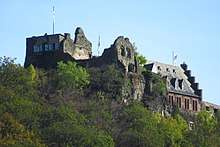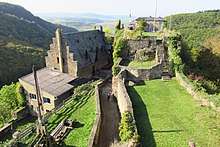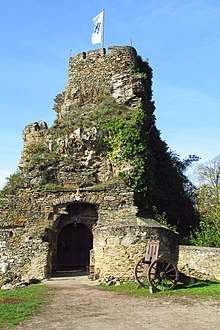Schloss Veldenz
Schloss Veldenz in the Moselle valley region is a castle ruin about 1.5 kilometres (0.9 mi) southeast of the village of Veldenz in the German state of Rhineland-Palatinate.



Location
The site is in the Rhineland-Palatinate in the county of Bernkastel-Wittlich. It is on a hill spur, roughly 320 metres (1,050 ft) above sea level and 180 metres (590 ft) above the level of the Mosel.
It is on the slopes of the Hunsrück in a side valley of the Moselle through which the Veldenzer Bach. The town of Bernkastel-Kues is 4 kilometres (2.5 mi) northeast, the county town of Wittlich is about 15 kilometres (9 mi) northwest, and the nearest city is Trier, 31 kilometres (19 mi) southwest (all distances in a straight line).
History
The first written reference to the castle was in the year 1156 (possibly a few years earlier). Frederick I (Barbarossa) confirmed the holding by Bishop Albert I of Verdun of the castle together with the surrounding land.
Since the 12th century, the Counts of Veldenz have been the feudal lords of the land and the castle, which became centre of the County of Veldenz. In 1286 Rudolf von Habsburg granted Veldenz city and market charters.
In 1444 the castle and surrounding area came into the possession of the counts of Pfalz-Zweibrücken due to the extinction of the Veldenz male line. They and their successors remained in possession of the castle and county until the year 1694, even though during the intervening Thirty Years War followed approximately 150 years later by the Palatinian Succession War the castle was occupied by Swedish, Spanish and French troops.
Finally in 1681, the castle was destroyed. In the following years, the owner moved and often used the ruin as a quarry, over time it belonged to the Electorate of the Palatinate and Bavaria. Since 1807, it is in private hands and is now owned by the Haufs-Brusberg family.
Today
In the 15th century the site was the largest castle in the Central Moselle. This fact would appear to explain the German term Schloss in the name which is still used today. At the same time it distinguishes it from the castle Nohfelden known in German as "Burg Veldenz".
The extensive ruins of the spur castle were structurally secured and partly rebuilt in the 19th century. They are on a high hill spur that drops away steeply on three sides. They are almost 100 metres (330 ft) long and 30 metres (98 ft) wide.
On the main defensive side in the north and similarly on the southern flank there is a powerful bastion. The bergfried in the east was not rebuilt, in contrast to the palas with its distinctive stepped gable, which is now used as a restaurant.
Literature
- Alexander Thon/Stefan Ulrich, "Von den Schauern der Vorwelt umweht...". Burgen und Schlösser an der Mosel, Regensburg: Schnell & Steiner 2007, S. 148-153. ISBN 978-3-7954-1926-4